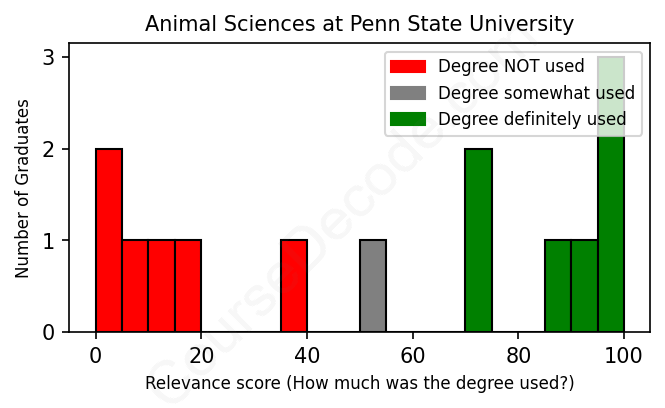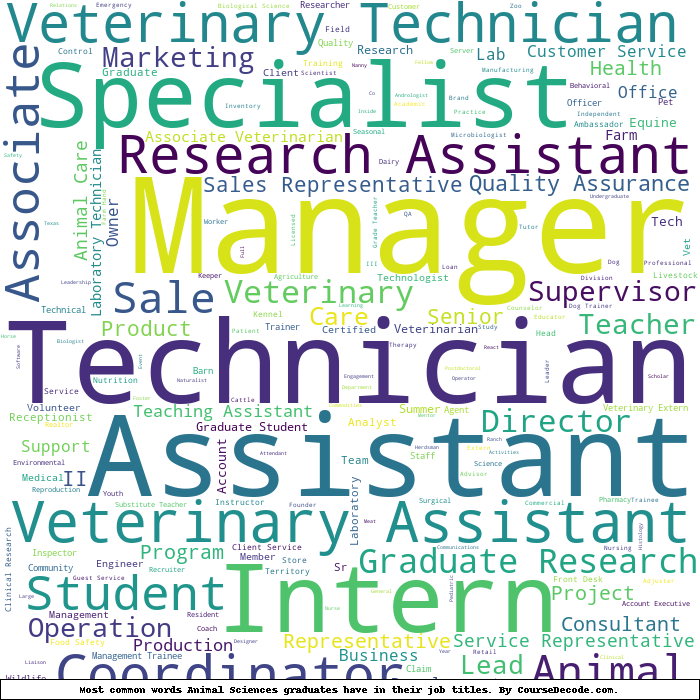
First, some facts. Of the Animal Sciences graduates from Penn State University we've analyzed , here's how many have used (or NOT used) their degree in their career:

These are estimates based on AI analysis of 14 LinkedIn profiles (see below).
The verdict? Significantly below average. Overall, with an average relevance score of 53%, Animal Sciences graduates from Penn State University have a much lower likelihood (-14%) of finding work in this field compared to the average graduate across all fields:
And for comparison, here's the chart for all profiles we've looked at across all degrees.
Also, after graduating, 35% of these graduates have pursued further education other than another Bachelor's degree (such as a Masters degree or other), which is right in line with the average across all fields.
See the details:
|
Relevance score: 37% We think this person has NOT gone into a career related to their degree. We think this person has NOT gone into a career related to their degree.
DEGREE INFOGraduated in 2019 from Penn State University with a Bachelor's degree in Animal Sciences. No other secondary education since. JOB HISTORY SINCE GRADUATIONIntern Centre County 4-H May 2019 - Aug 2019 Floral Designer  Woodrings Floral Gardens Dec 2019 - May 2022 Customer Service Representative  Whitetail Lane Farm Apr 2021 - Jun 2022 Client Specialist  Wienken Wealth Management Jun 2022 - Oct 2022 Volunteer  Centre County 4-H Jan 2022 - Present Fair Fund Assistant  AGRICULTURE, PENNSYLVANIA DEPARTMENT OF Oct 2022 - Present ABOUTMy lifelong experiences in agriculture have molded me into a driven individual with a hunger to learn more and excel at any task at hand. Growing up, I have always had a passion for livestock and crop farming, which stems from time spent on my grandparents dairy farm. From the age of eight, I have been involved in raising and showing registered Jersey cattle through 4-H and FFA, as well as competing with beef steers, market goats, and ABGA breeding goats over the years. Throughout my years as a member of 4-H, I held offices in four different clubs; at one point holding offices in three of them simultaneously. Serving in the positions of secretary, treasurer, vice-president, and president laid the groundwork for my organizational skills, and created an understanding of the importance of teamwork, leadership, and being involved in something bigger than yourself. These skills enabled me to secure my first internship, in the summer of 2017, with the PA Farm Bureau, where I served as a communications intern. I aided in outreach and the dissemination of materials to members, researching and writing articles for the Bureaus publications, and planning and running the Friends of Agriculture Foundations annual Educators Ag Institute (EAI), among others. For the summer of 2018, I was selected to be a part of the AgChoice Farm Credit summer intern team, which expanded my skills in regards to lending procedures, formulating balance sheets, and, most importantly, helping farmers from all industries to accomplish their goals. I was also fortunate enough to spend the summer of 2019 as the 4-H Summer Assistant for my local extension office. From June through August, I had the opportunity to plan and carry out several workshops for our 4-H members which included fairy gardening, baking, and a Cloverbud camp. The projects made at these workshops were then eligible to be entered into the county fair during Roundup. Promoting agriculture to the general public is my primary passion. Since graduating from Penn State with a degree in Animal Science and a minor in Agribusiness Management in 2018, I have become a 4-H leader and run a farm operation of my own where I breed and show registered Boer goats and various breeds of registered beef cattle. |
The top 10 most common jobs done by the graduates we've analyzed (ranked most common to least) are:
When looking at the job paths of Penn State Animal Sciences graduates, it’s clear that a variety of roles are represented, but many align closely with the skills and knowledge from their degree. Positions like Veterinary Assistant, Veterinary Technician Manager, and roles in dog training or animal care management seem to be the most common paths. These jobs directly utilize the expertise that comes from studying animal health, behavior, and welfare. Even roles like Director of Business Development at animal hospitals integrate the knowledge from the degree into business operations, showing that there are indeed relevant jobs right out there for Animal Sciences graduates.
However, it's noteworthy that not all positions are directly relevant. Some graduates have ventured into unrelated fields such as marketing, human resources, and event coordination, which don’t directly apply the specialized skills they learned during their studies. Even roles in management or administration in businesses that deal with animals often don’t rely heavily on Animal Sciences training. This mix highlights that while many graduates find fulfilling roles that make great use of their education, there are also quite a few who end up in jobs that don’t utilize their degree's core concepts. So, while there's a solid pathway into animal-related careers, there's also a noticeable drift into general business or unrelated sectors for some folks.
Here is a visual representation of the most common words in job titles for Animal Sciences graduates (this is across all Animal Sciences graduates we've analyzed, not just those who went to Penn State University):

It seems like graduates from Penn State's Animal Sciences program have explored a variety of career paths, especially in the early stages after graduation. Many have started out in roles directly connected to animal care, like being veterinary assistants or trainers, often at places like PETCO or veterinary hospitals. After a few years, it looks like some have successfully climbed the ladder into more specialized roles, such as veterinary technicians or managers in animal-related businesses. Others have branched out into different areas, like research or even business development, which indicates a blend of skills that they gained during their studies.
However, it's worth noting that not all graduates continued on a strictly animal-focused path. Some have ventured into completely different fields, like human resources or administrative roles, which could speak to either a broader interest or the need to find a stable job after graduation. Five to ten years down the line, we can see a mixed bag: some have remained in animal sciences or related industries, while others have shifted into roles that seem only tangentially related. Overall, it's clear that while many graduates have found relevant careers within animal sciences, there's also a significant portion who have ended up in jobs that don’t directly relate to their major. So, if you're passionate about animals and thinking of studying Animal Sciences, know that there are multiple pathways you could take after graduation!
Hey! So, when it comes to a Bachelor’s in Animal Sciences at Penn State, it’s kind of a mixed bag. It’s definitely not a walk in the park, but if you’re passionate about animals and science, you might find it more engaging than difficult. You’ll dive into subjects like biology, nutrition, animal behavior, and genetics, which can be intense depending on your background in science. Some students find the hands-on experiences with animals really rewarding, which helps balance out the tough coursework. Overall, it’s probably about average in terms of difficulty for a college degree, especially if you’re into it, but be prepared to hit the books and do some serious studying!
Most commonly, in the LinkedIn profiles we've looked at, it takes people 4 years to finish a Bachelor degree in Animal Sciences.
Looking at the career paths of these Animal Sciences grads from Penn State, it seems like some of them are doing pretty well financially, while others might be on the lower end of the spectrum. For instance, the folks who got managerial roles or specialized positions, like a Technical Services Director or a Director of Business Development, likely have salaries in the upper ranges for their fields. But then there are those who started in more hands-on or support roles, like a Veterinary Assistant or Daycare Counselor, and those jobs generally don’t pay as well. Given the variety of positions and the likely pay ranges in animal science, it's safe to say that while some graduates are probably making decent money, others might still be finding their footing and earning less, especially early in their careers. So, it all depends on the specific job and level of responsibility they've taken on!
Here is a visual representation of the most common words seen in the "about" section of LinkedIn profiles who have a Bachelor degree in Animal Sciences (this is across all Animal Sciences graduates we've analyzed, not just those who went to Penn State University). This may or may not be useful:

Here are all colleges offering a Bachelor degree in Animal Sciences (ordered by the average relevance score of their Animal Sciences graduates, best to worst) where we have analyzed at least 10 of their graduates:
| College | Score | Count |
|---|---|---|
 Purdue University Purdue University
|
80 | 14 |
 California State Polytechnic University-Pomona California State Polytechnic University-Pomona
|
78 | 13 |
 North Carolina State University North Carolina State University
|
77 | 18 |
 Iowa State University Iowa State University
|
75 | 25 |
 University of Missouri-Columbia University of Missouri-Columbia
|
75 | 12 |
 South Dakota State University South Dakota State University
|
73 | 10 |
 The Ohio State University The Ohio State University
|
71 | 21 |
 University of Florida University of Florida
|
68 | 15 |
 University of Vermont University of Vermont
|
68 | 12 |
 Michigan State University Michigan State University
|
67 | 20 |
 University of California, Davis University of California, Davis
|
66 | 27 |
 University of Illinois at Urbana-Champaign University of Illinois at Urbana-Champaign
|
63 | 16 |
 University of Tennessee, Knoxville University of Tennessee, Knoxville
|
61 | 13 |
 University of Arkansas University of Arkansas
|
60 | 10 |
 California Polytechnic State University-San Luis Obispo California Polytechnic State University-San Luis Obispo
|
59 | 22 |
 University of Wisconsin-River Falls University of Wisconsin-River Falls
|
58 | 10 |
 Texas A&M University Texas A&M University
|
54 | 34 |
 Penn State University Penn State University
|
53 | 14 |
 Texas Tech University Texas Tech University
|
51 | 12 |
 Kansas State University Kansas State University
|
51 | 22 |
 Oklahoma State University Oklahoma State University
|
43 | 16 |